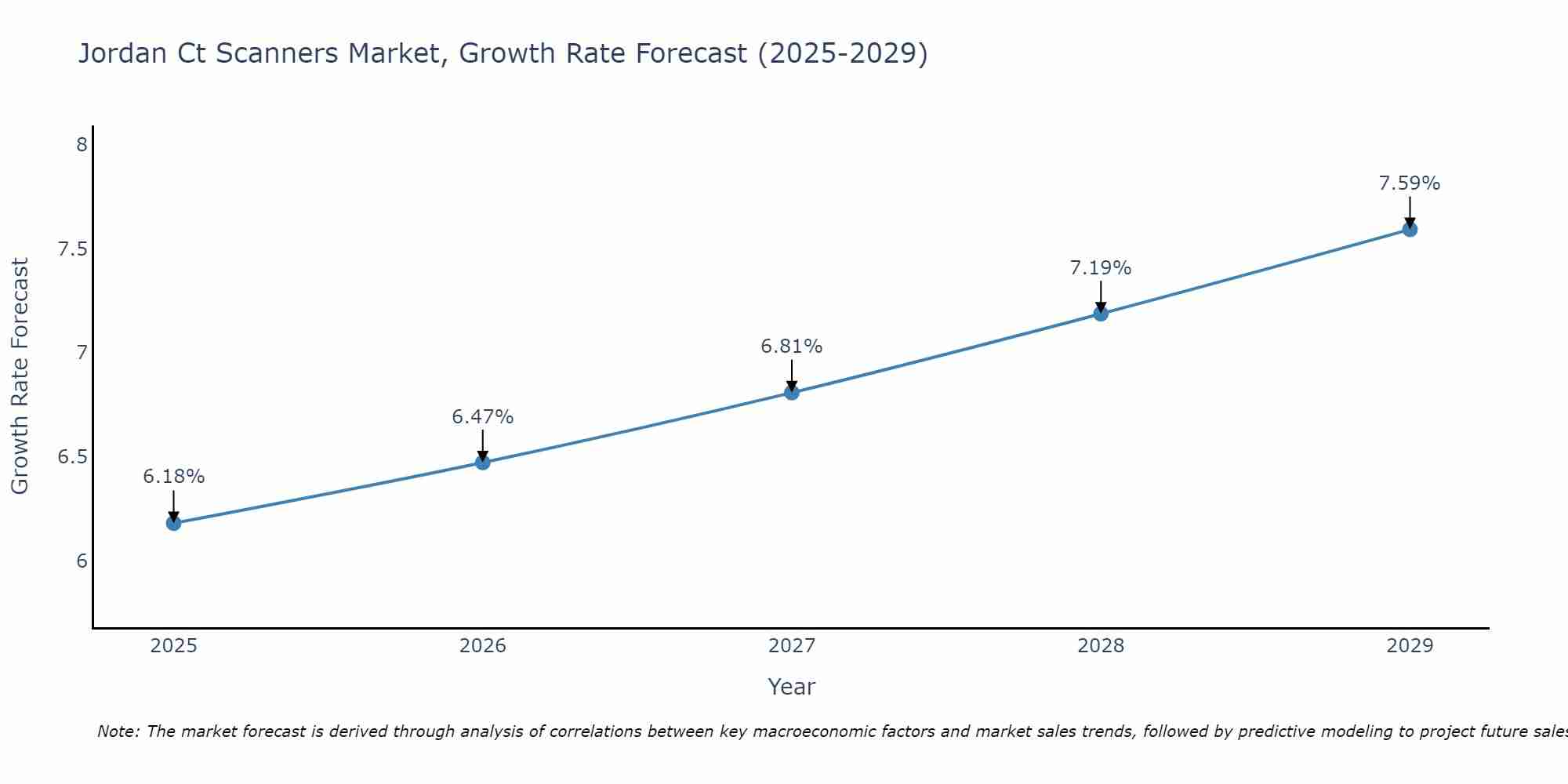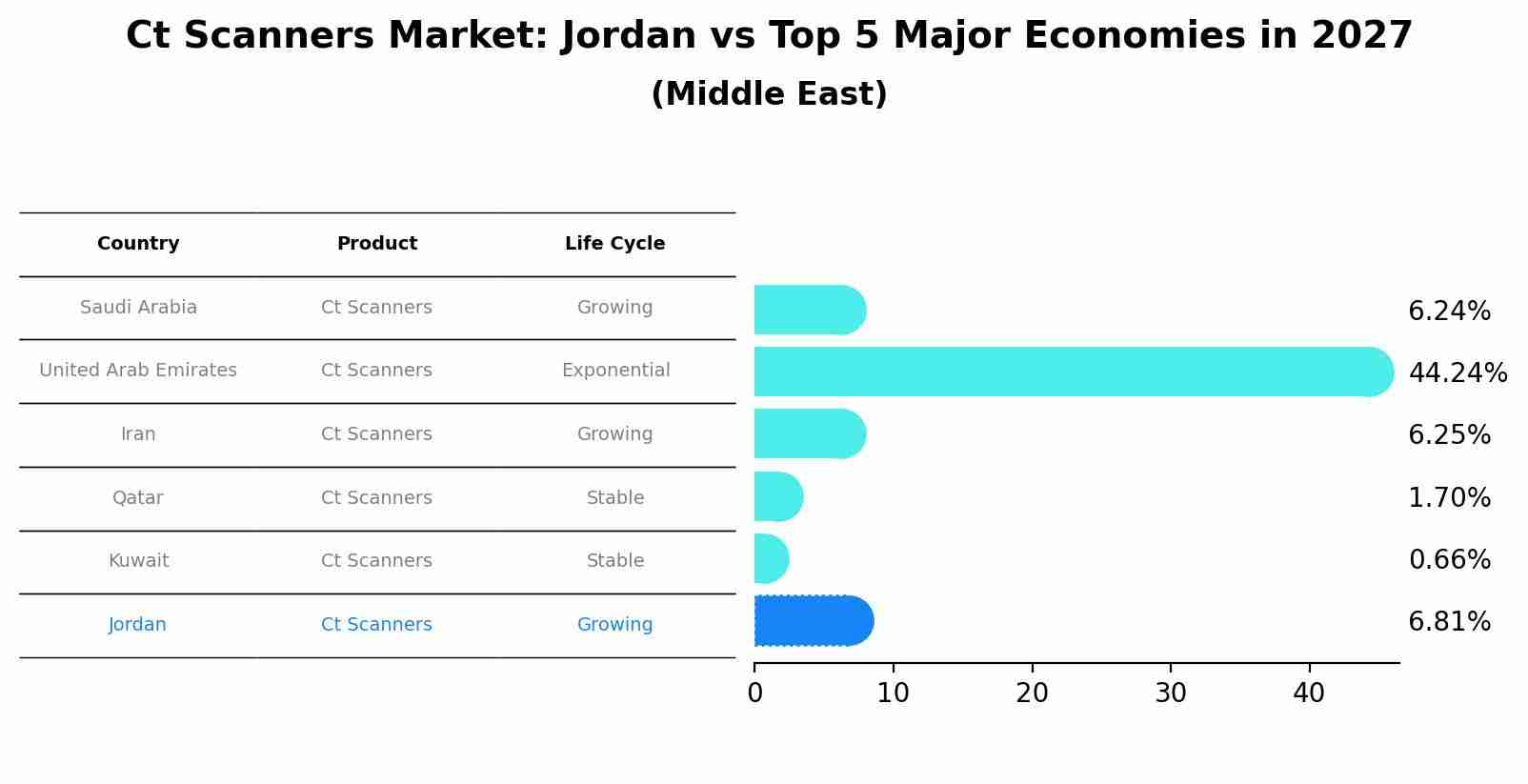Jordan Ct Scanners Market Outlook | Share, Value, Companies, Size, Trends, Industry, Forecast, Revenue, Analysis, COVID-19 IMPACT & Growth
| Product Code: ETC362806 | Publication Date: Aug 2022 | Updated Date: Aug 2025 | Product Type: Market Research Report | |
| Publisher: 6Wresearch | Author: Bhawna Singh | No. of Pages: 75 | No. of Figures: 35 | No. of Tables: 20 |
Jordan Ct Scanners Market Size Growth Rate
The Jordan Ct Scanners Market is likely to experience consistent growth rate gains over the period 2025 to 2029. Commencing at 6.18% in 2025, growth builds up to 7.59% by 2029.

Ct Scanners Market: Jordan vs Top 5 Major Economies in 2027 (Middle East)
The Ct Scanners market in Jordan is projected to grow at a growing growth rate of 6.81% by 2027, highlighting the country's increasing focus on advanced technologies within the Middle East region, where Saudi Arabia holds the dominant position, followed closely by United Arab Emirates, Iran, Qatar and Kuwait, shaping overall regional demand.

Jordan Ct Scanners Market Synopsis
The Jordan CT Scanners market is experiencing steady growth driven by increasing demand for advanced medical imaging technologies in the healthcare sector. Hospitals and diagnostic centers are adopting CT scanners for accurate and timely diagnosis of various medical conditions. The market is characterized by a competitive landscape with key players such as Siemens Healthineers, GE Healthcare, and Philips Healthcare dominating the market. Technological advancements in CT scanning, such as dual-source CT and spectral imaging, are fueling market growth. Additionally, the rising prevalence of chronic diseases and the need for early detection are also contributing to market expansion. Government initiatives to improve healthcare infrastructure and increase access to advanced medical equipment are further propelling the growth of the CT scanners market in Jordan.
Jordan Ct Scanners Market Trends
The current trends in the Jordan CT Scanners Market indicate a growing demand for advanced imaging technology to improve diagnostic capabilities and patient outcomes. Key trends include the adoption of low-dose CT scanners to minimize radiation exposure, increased integration of artificial intelligence and machine learning algorithms for image analysis, and the development of portable and compact CT scanners for greater accessibility in remote areas. Additionally, there is a shift towards multi-slice CT scanners with higher speed and resolution for more detailed imaging, as well as a focus on enhancing patient comfort and reducing scan times. Overall, the market is witnessing a drive towards innovation and efficiency in CT scanner technology to meet the evolving needs of healthcare providers and patients in Jordan.
Jordan Ct Scanners Market Challenges
The Jordan CT scanners market faces several challenges, including the high cost of acquiring and maintaining advanced CT scanner technology, which can be a barrier for healthcare facilities with limited budgets. Additionally, there is a shortage of skilled professionals, such as radiologists and technicians, who are trained to operate and interpret CT scan results accurately. Ensuring patient safety and minimizing radiation exposure during CT scans is another challenge that healthcare providers must address. Furthermore, competition among CT scanner manufacturers and vendors in the Jordan market can lead to pricing pressures and the need for differentiation through innovative features and services. Overall, navigating these challenges requires strategic planning, investment in training and technology, and a deep understanding of local healthcare regulations and patient needs.
Jordan Ct Scanners Market Investment Opportunities
The Jordan CT scanners market presents a promising investment opportunity due to the increasing demand for advanced medical imaging technology in the country. Factors such as the growing prevalence of chronic diseases, rising healthcare infrastructure development, and government initiatives to enhance healthcare services are driving the demand for CT scanners in Jordan. Additionally, the increasing awareness among healthcare providers and patients about the benefits of early disease detection and accurate diagnosis further boosts the market growth. Investing in the Jordan CT scanners market offers potential for significant returns, especially for companies that offer innovative and cost-effective solutions tailored to the local market needs. Collaborating with local healthcare institutions and leveraging strategic partnerships can help investors capitalize on the expanding market opportunities in Jordan`s CT scanners sector.
Jordan Agar Market Government Policies
Government policies related to the Jordan CT Scanners Market aim to ensure the safety, quality, and accessibility of healthcare services. The Jordanian government regulates the importation, distribution, and use of CT scanners through the Ministry of Health, which sets standards for equipment performance and operator training. Additionally, there are guidelines in place to control the pricing and reimbursement of CT scans to make them more affordable for patients. The government also encourages investment in healthcare infrastructure to expand access to advanced diagnostic technologies like CT scanners across the country. Overall, the government`s policies in Jordan focus on promoting quality healthcare services while also fostering innovation and growth in the medical technology sector.
Jordan Ct Scanners Market Future Outlook
The future outlook for the Jordan CT scanners market appears to be positive, driven by factors such as the increasing prevalence of chronic diseases, technological advancements in CT scanning devices, and growing demand for early and accurate diagnosis. With a focus on improving healthcare infrastructure and rising investments in the healthcare sector, the demand for CT scanners is expected to continue to rise in Jordan. Additionally, the shift towards value-based healthcare and the adoption of advanced imaging technologies for personalized treatment plans are likely to further boost the market growth. However, challenges such as high costs associated with CT scanners and limited access to advanced healthcare facilities in rural areas may hinder market expansion to some extent. Overall, the Jordan CT scanners market is poised for steady growth in the coming years.
Key Highlights of the Report:
- Jordan Ct Scanners Market Outlook
- Market Size of Jordan Ct Scanners Market, 2021
- Forecast of Jordan Ct Scanners Market, 2031
- Historical Data and Forecast of Jordan Ct Scanners Revenues & Volume for the Period 2018 - 2031
- Jordan Ct Scanners Market Trend Evolution
- Jordan Ct Scanners Market Drivers and Challenges
- Jordan Ct Scanners Price Trends
- Jordan Ct Scanners Porter's Five Forces
- Jordan Ct Scanners Industry Life Cycle
- Historical Data and Forecast of Jordan Ct Scanners Market Revenues & Volume By Type for the Period 2018 - 2031
- Historical Data and Forecast of Jordan Ct Scanners Market Revenues & Volume By Stationary CT scanners for the Period 2018 - 2031
- Historical Data and Forecast of Jordan Ct Scanners Market Revenues & Volume By Portable CT scanners for the Period 2018 - 2031
- Historical Data and Forecast of Jordan Ct Scanners Market Revenues & Volume By Device Architecture for the Period 2018 - 2031
- Historical Data and Forecast of Jordan Ct Scanners Market Revenues & Volume By C-arm CT Scanners for the Period 2018 - 2031
- Historical Data and Forecast of Jordan Ct Scanners Market Revenues & Volume By O-arm CT Scanners for the Period 2018 - 2031
- Historical Data and Forecast of Jordan Ct Scanners Market Revenues & Volume By Technology for the Period 2018 - 2031
- Historical Data and Forecast of Jordan Ct Scanners Market Revenues & Volume By High-slice CT for the Period 2018 - 2031
- Historical Data and Forecast of Jordan Ct Scanners Market Revenues & Volume By Mid-slice CT for the Period 2018 - 2031
- Historical Data and Forecast of Jordan Ct Scanners Market Revenues & Volume By Low-slice CT for the Period 2018 - 2031
- Historical Data and Forecast of Jordan Ct Scanners Market Revenues & Volume By Cone-beam CT for the Period 2018 - 2031
- Historical Data and Forecast of Jordan Ct Scanners Market Revenues & Volume By Application for the Period 2018 - 2031
- Historical Data and Forecast of Jordan Ct Scanners Market Revenues & Volume By Human Application for the Period 2018 - 2031
- Historical Data and Forecast of Jordan Ct Scanners Market Revenues & Volume By Diagnostic Applications for the Period 2018 - 2031
- Historical Data and Forecast of Jordan Ct Scanners Market Revenues & Volume By Cardiology Applications for the Period 2018 - 2031
- Historical Data and Forecast of Jordan Ct Scanners Market Revenues & Volume By Oncology Applications for the Period 2018 - 2031
- Historical Data and Forecast of Jordan Ct Scanners Market Revenues & Volume By Neurology Applications for the Period 2018 - 2031
- Historical Data and Forecast of Jordan Ct Scanners Market Revenues & Volume By Intraoperative Applications for the Period 2018 - 2031
- Historical Data and Forecast of Jordan Ct Scanners Market Revenues & Volume By Veterinary Application for the Period 2018 - 2031
- Historical Data and Forecast of Jordan Ct Scanners Market Revenues & Volume By Research Application for the Period 2018 - 2031
- Jordan Ct Scanners Import Export Trade Statistics
- Market Opportunity Assessment By Type
- Market Opportunity Assessment By Device Architecture
- Market Opportunity Assessment By Technology
- Market Opportunity Assessment By Application
- Jordan Ct Scanners Top Companies Market Share
- Jordan Ct Scanners Competitive Benchmarking By Technical and Operational Parameters
- Jordan Ct Scanners Company Profiles
- Jordan Ct Scanners Key Strategic Recommendations
Frequently Asked Questions About the Market Study (FAQs):
- Single User License$ 1,995
- Department License$ 2,400
- Site License$ 3,120
- Global License$ 3,795
Search
Thought Leadership and Analyst Meet
Our Clients
Related Reports
- Germany Breakfast Food Market (2026-2032) | Industry, Share, Growth, Size, Companies, Value, Analysis, Revenue, Trends, Forecast & Outlook
- Australia Briquette Market (2025-2031) | Growth, Size, Revenue, Forecast, Analysis, Trends, Value, Share, Industry & Companies
- Vietnam System Integrator Market (2025-2031) | Size, Companies, Analysis, Industry, Value, Forecast, Growth, Trends, Revenue & Share
- ASEAN and Thailand Brain Health Supplements Market (2025-2031) | Strategy, Consumer Insights, Analysis, Investment Trends, Opportunities, Growth, Size, Share, Industry, Revenue, Segments, Value, Segmentation, Supply, Forecast, Restraints, Outlook, Competition, Drivers, Trends, Demand, Pricing Analysis, Competitive, Strategic Insights, Companies, Challenges
- ASEAN Bearings Market (2025-2031) | Strategy, Consumer Insights, Analysis, Investment Trends, Opportunities, Growth, Size, Share, Industry, Revenue, Segments, Value, Segmentation, Supply, Forecast, Restraints, Outlook, Competition, Drivers, Trends, Demand, Pricing Analysis, Competitive, Strategic Insights, Companies, Challenges
- Europe Flooring Market (2025-2031) | Outlook, Share, Industry, Trends, Forecast, Companies, Revenue, Size, Analysis, Growth & Value
- Saudi Arabia Manlift Market (2025-2031) | Outlook, Size, Growth, Trends, Companies, Industry, Revenue, Value, Share, Forecast & Analysis
- Uganda Excavator, Crane, and Wheel Loaders Market (2025-2031) | Strategy, Consumer Insights, Analysis, Investment Trends, Opportunities, Growth, Size, Share, Industry, Revenue, Segments, Value, Segmentation, Supply, Forecast, Restraints, Outlook, Competition, Drivers, Trends, Demand, Pricing Analysis, Competitive, Strategic Insights, Companies, Challenges
- Rwanda Excavator, Crane, and Wheel Loaders Market (2025-2031) | Strategy, Consumer Insights, Analysis, Investment Trends, Opportunities, Growth, Size, Share, Industry, Revenue, Segments, Value, Segmentation, Supply, Forecast, Restraints, Outlook, Competition, Drivers, Trends, Demand, Pricing Analysis, Competitive, Strategic Insights, Companies, Challenges
- Kenya Excavator, Crane, and Wheel Loaders Market (2025-2031) | Strategy, Consumer Insights, Analysis, Investment Trends, Opportunities, Growth, Size, Share, Industry, Revenue, Segments, Value, Segmentation, Supply, Forecast, Restraints, Outlook, Competition, Drivers, Trends, Demand, Pricing Analysis, Competitive, Strategic Insights, Companies, Challenges
Industry Events and Analyst Meet
Whitepaper
- Middle East & Africa Commercial Security Market Click here to view more.
- Middle East & Africa Fire Safety Systems & Equipment Market Click here to view more.
- GCC Drone Market Click here to view more.
- Middle East Lighting Fixture Market Click here to view more.
- GCC Physical & Perimeter Security Market Click here to view more.
6WResearch In News
- Doha a strategic location for EV manufacturing hub: IPA Qatar
- Demand for luxury TVs surging in the GCC, says Samsung
- Empowering Growth: The Thriving Journey of Bangladesh’s Cable Industry
- Demand for luxury TVs surging in the GCC, says Samsung
- Video call with a traditional healer? Once unthinkable, it’s now common in South Africa
- Intelligent Buildings To Smooth GCC’s Path To Net Zero


















